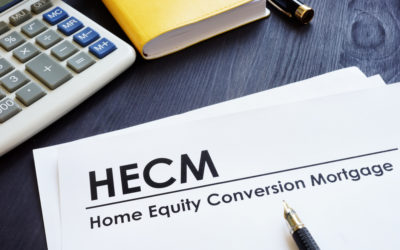If you’re considering a reverse mortgage or HECM loan, it’s important to research the financial impact of this unique retirement option. A reverse mortgage loan allows you to take advantage of the equity in your home by converting it into loan proceeds you can use as you see fit.
To qualify for a reverse mortgage, you have to meet certain criteria, such as:
- be 62 years of age or older
- live in a property you own that serves as your primary residence
- and have a substantial amount of equity in your home
You may be wondering how taxes factor into the picture when you’re looking into a reverse mortgage. Keep reading for a full overview of the tax implications of reverse mortgages or simply navigate to the section related to your question.
How does a reverse mortgage work? What are the costs?
A reverse mortgage loan is a financial product retirees can utilize to turn the equity in their home into usable loan proceeds.
Reverse mortgage costs vary depending on the lender but at the minimum, you can expect to pay upfront fees that include the cost of a HUD-approved counseling session, property taxes, insurance fees, and other required financial obligations.
How does a reverse mortgage affect your taxes?
As we will explain a little more in depth below, a reverse mortgage allows you to convert the equity—or, the ownership stake in your home—to loan proceeds. Because of this, one of the advantages of a reverse mortgage is that you’re not required to pay taxes to the IRS on said loan proceeds.
The costs you are responsible for in a reverse mortgage include property taxes, homeowner’s insurance, and any property-related expenses, among other reverse mortgage fees that vary based on the lender and circumstances.
Are the proceeds from a reverse mortgage taxable?
There is no “reverse mortgage tax” because your reverse mortgage proceeds aren’t considered income, according to the IRS. Rather, they’re loan proceeds and therefore do not fall under the category of “income earned.”
Your reverse mortgage payments usually don’t affect benefits such as Social Security and Medicare benefits, but this may vary on a case by case basis.
Note: Your reverse mortgage proceeds can be paid out in a lump sum, line of credit, on a monthly schedule or in a combination. However, all disbursement options will not be subject to reverse mortgage taxes.

Is interest paid on a reverse mortgage tax deductible?
Some or all of the interest accrued on a HECM loan may be deductible but only when the interest is actually paid. The interest must be paid when the loan becomes Due and Payable. This happens when a maturity event occurs. A maturity event may be one of the following life occurrences:
- You sell your home
- You pass away
- You live outside of the property for 12 consecutive months
- You fail to keep up with home maintenance such as repairs according to FHA standards
- You fail to pay property taxes or insurance
The final loan balance owed for your reverse mortgage includes the interest accrued over the life of the loan, mortgage insurance premiums, and any other unpaid financial obligations.
Your reverse mortgage interest deduction has the same limits as other home equity loans; you can deduct interest on no more than a loan of $100,000.
Do you have to pay property taxes when you have a reverse mortgage?
Yes, you are required to pay your property taxes, maintain your property, and pay homeowners insurance with a HECM loan.
Property maintenance
FHA has minimum property standards designed to protect both the health of the home’s occupants and the integrity of the property. These standards include the following:
- Intact electrical box
- Adequate roofing
- Water heater up to code
- Property access that is safe for pedestrian and vehicles
- Structural integrity (no decay, leakages, termite damage, and other serious issues)
- A bathroom with a toilet, sink, and shower
Keep these requirements in mind if you know that your property is going to need major repairs or if you live in an older home that will likely need repair in the near future. You may be able to deduct some maintenance repairs on your tax return.
Property taxes and insurance
If you don’t consistently pay your property taxes and homeowner’s insurance, or if you don’t maintain the condition of your property, the loan may go into default.
If you don’t find a way to resolve this issue with your lender, the lending institution could foreclose on your home.
Note: When you apply for a HECM loan, the lender takes your overall financial health into consideration and offers you a loan based on your ability to settle your financial obligations, such as property liens and existing mortgages.
FHA policy states that lenders make loan decisions that are sustainable for a borrower’s financial situation. Not only are HECMs designed to help seniors, but policies are also established to enhance sustainability for the entire HECM program and protect FHA insurance funds.
Getting Started with Reverse Mortgages
If you’re looking to get started with a reverse mortgage, these articles can help guide you through all aspects of the process.
Guide to HECM Loan Reverse Mortgage Limits
Set-asides
If the lender determines you don’t have enough to cover property tax and other expenses, the lender may set aside some of your reverse mortgage proceeds to pay these bills in the future.
A set-aside account is a portion of your reverse mortgage loan proceeds used to pay your property tax and insurance obligations in the future.
Set-asides are a way to give both you and the lender peace-of-mind and ensure that you have the money to meet your HECM financial requirements. However, you should be aware that there is a risk of foreclosure should you run out of money to pay your property taxes, insurance, or fail to maintain your property, even if you have a set-aside.

What if I’m having trouble paying my taxes and insurance?
Maybe you had unexpected medical expenses come up or another life-altering event and you’ve found yourself behind on your property taxes or insurance payments. If this is the case, there may be local programs to assist you so you can continue living in your home such as a reverse mortgage foreclosure prevention counselor.
If you stop paying taxes and insurance, your lender could foreclose on your home, so it’s important to stay current with these payments.
The Consumer Finance Protection Bureau (CFPB) suggests the credit agencies below if you need HECM foreclosure prevention counseling:
- National Council on Aging
- CredAbility
- Money Management International
- National Foundation for Credit Counseling
- NeighborWorks America
Are borrowers with delinquent tax liens or federal tax debts able to procure a HECM loan?
No, HECM borrowers must settle all federal tax debts to qualify for a reverse mortgage. Lending institutions are required to pause processing a reverse mortgage loan until the debt has been settled with the creditor. Tax liens can remain unpaid but only if the reverse mortgage borrower has started a repayment plan. The borrower must have made a minimum of three months of scheduled payments before entering into a HECM loan agreement and cannot prepay to meet the three-month minimum.
Lenders are also required to check public records in order to ascertain the borrower in question doesn’t owe any federal debt and doesn’t have a tax lien against their primary residence.
Explore your options today with GoodLife
A reverse mortgage might be the key to unlocking your dream retirement lifestyle so that you can live The GoodLife. With that said, it’s important to be fully informed regarding the requirements for a HECM loan, especially in regards to financial matters such as the tax consequences of reverse mortgages. You’ll have to make sure that you can pay property taxes, any insurance premiums, maintenance fees, and other costs associated with HECM loans.
If you fail to keep current on your payments, your loan may become Due and Payable. In this situation, your entire loan amount falls due.
However, with these risks and rewards in mind, a reverse mortgage is a financial strategy that can be used to peacefully age in place—without the strain of traditional monthly mortgage payments. Still not sure how a reverse mortgage works? Feel free to contact one of our GoodLife representatives to answer any other reverse mortgage related questions you may have not covered on this page. To start your reverse mortgage application process today, simply contact one of our helpful GoodLife mortgage representatives to find out whether you qualify.

 1-866-840-0279
1-866-840-0279


